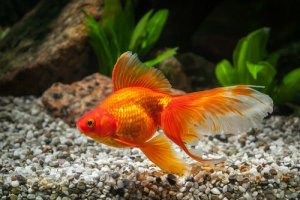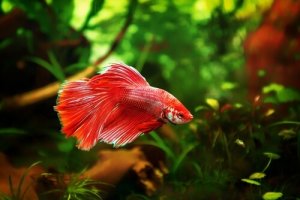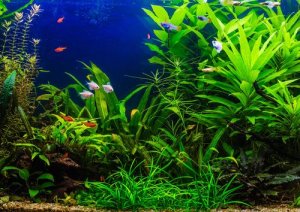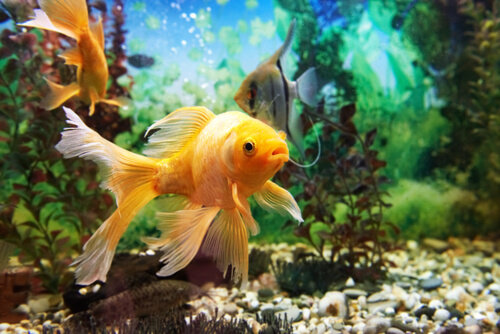
Goldfish are the most popular fish you will find in tanks. For many centuries they have been the favored fish for first-time fish owners. Goldfish are hardy and are much easier to take care of, especially as a newbie aquarist.
Learning about goldfish is easy there is plenty of information on them due to their popularity. In this article, goldfish, diets, and what you need to know about feeding them will be covered. If you’re wondering how long can a goldfish go without food, this guide answers that question. We will also explore the causes of goldfish death and what to do about a goldfish not moving.
What You Need To Know About Goldfish Survival
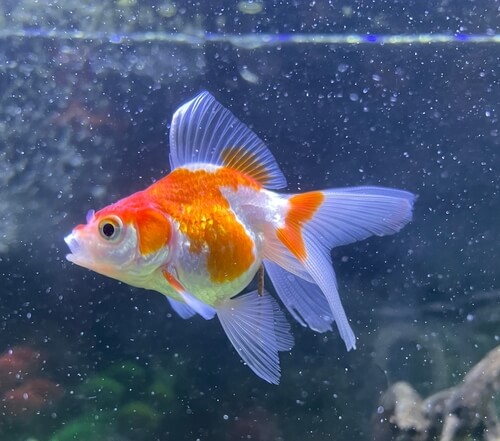
If you simply want to know the answer to “how long can a goldfish go without food,” the fact is that they can last for up to 2 weeks. However, this figure can be influenced by a variety of factors. Therefore, there’s no guarantee that all the goldfish in your tank will live for 2 weeks after being unfed. Each goldfish responds differently to being unfed for long periods. So what works for one may not work for the other.
Many aquarists have found ways to keep their goldfish fed while on vacation. A few genius methods of fishkeeping have emerged over the years that help fish lovers keep their pets well-fed.
How Long Can A Goldfish Survive In A Pond
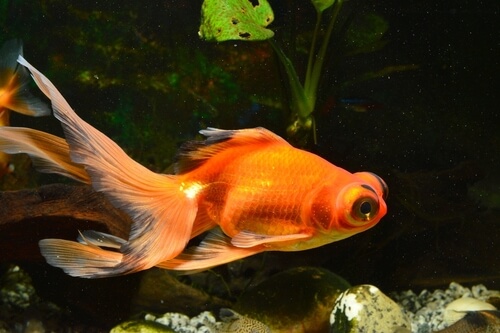
If you’re one of the rare aquarists who keep their goldfish in a pond, this answer is specifically for you. One of the causes of goldfish death is starvation, so keeping it in a pond is an excellent way to avoid that fate. They can last much longer than their tank counterparts.
This is because they can access food from insects, plants, and algae in this environment. In addition, because of the environment, they are in, they learn how to scavenge successfully. This not only keeps them fed but also improves their physical health and keeps them sharp.
While ponds require less maintenance than tanks, you’ll still need to keep a close eye on the conditions to tell if it is safe for your goldfish. For ponds, “how long can a goldfish go without food” becomes much more varied. However, expect that they will surpass the 2-week threshold that their tank counterparts are limited to.
They can last for months and sometimes even longer. In the winter, pond goldfish enter into hibernation to slow their metabolism and reduce the need for regular feeding sessions.
How To Tell When A Goldfish Is Hungry
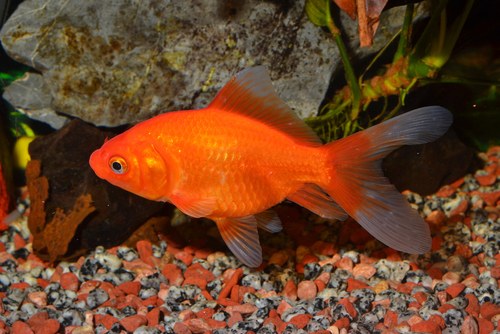
Goldfish are best cared for with a feeding schedule. As their primary caretaker, you must stick to a schedule and ensure that your goldfish don’t go hungry. If your domesticated fish misses a meal, it can mess with its routine. In addition, when your fish is left unfed for too long, it can manifest into signs of stress and even lead to illness.
If you find your goldfish swimming around in spots, you rarely see it visiting, this should be an indicator that it might be looking for food within your tank. Scavenging for food around your tank can be easy to spot if you’ve got a good sense of your goldfish’s behavior. If you spot it hanging around the top of your aquarium, this might also serve as a way to show that it is expecting a meal.
Aggression can also be a clear sign of your goldfish being hungry. An aggressive goldfish isn’t something easy to notice, but watching how it consumes food when it is eventually given a meal is another good indicator. Eating food quickly and not taking breaks between consumption can be bad for your pet’s digestion. Certain goldfish may even begin to harass their tankmates when they are hungry.
Factors To Consider When Feeding A Goldfish
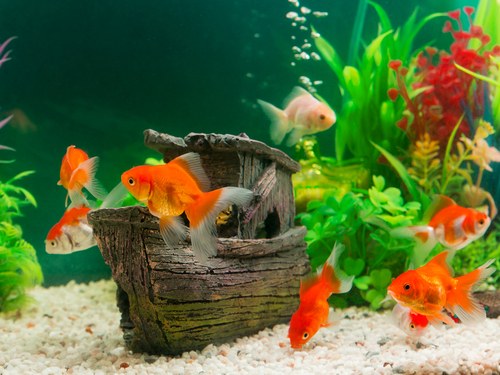
Goldfish are generally good eaters and will rush toward food when fed. However, different factors may affect your goldfish’s appetite. These are two important ones to consider:
1. Age
When a goldfish has fully matured, it doesn’t need as much food. In contrast, younger goldfish need more food for healthy growth, so at this stage in their life, frequent meals are necessary. A goldfish is typically fully grown when it is about a year old. Once it has reached two years of age, it may start to slow down, and because they are slower, they require less energy. Therefore, you may see your aquatic friend’s appetite get even smaller.
2. Water Temperature
Goldfish require water temperatures of 68-74 degrees Fahrenheit. So this means they can be comfortable in colder rooms. However, going above or below these temps can adversely affect your goldfish’s long-term health. If the water temperature goes below the recommended temperature, your goldfish’s metabolism may begin to slow down. This is why your fish may start eating less.
How To Feed A Goldfish When You Are Not Around
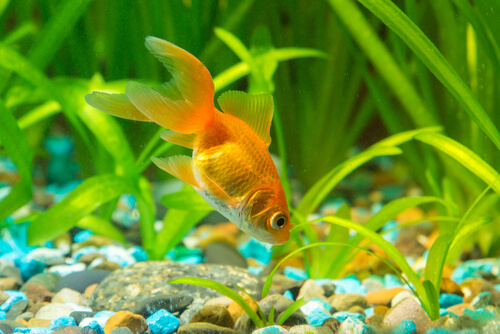
If you’re planning to go on a vacation as an aquarium owner, there’s going to be one thing at the back of your mind: caring for your fish. Without enough knowledge of particular concerns, like how long can a goldfish go without food, it can be a bit scary to just leave them there.
To help with this, we’ve got some ideas on what to do if you’re planning a vacation while your fish are at home. Goldfish typically last between 8 and 14 days without food, but the tank conditions are where things can get really concerning.
If your filters aren’t working, the water quality is poor, and temperatures are incorrect, problems in your tank can escalate, completely changing the life expectancy of your unfed goldfish. Suppose caution is not heeded. You might return to the horrific sight of your goldfish not moving.
1. Automatic Fish Feeder
For goldfish owners who are worried about their pets, there’s a solid solution that most fish owners use for feeding while on vacation. An automatic feeder is one of them. They come in a variety of brands and designs. Although they are a popular solution, you’ll need to approach your use of them with some caution.
While selecting a suitable automatic feeder, consider certain things, like the fish in your tank. One of the causes of goldfish death is overfeeding, so you’ll need to ensure that your feeder isn’t feeding too much or too little.
You should also pay attention to the quality of your feeder. A cheap one might have a friendly price tag, but the actual performance might lead to dangerous consequences for your fish. This can even result in you finding a sick or dead goldfish when you return from vacation. If you have time before your vacation, it’s best to buy the feeder and watch how it works beforehand. This way, you can ensure that the product is actually user-friendly.
Another thing to remember when using an automatic feeder is that condensation can build up, and clumped food can clog it. Certain mechanisms depend on it being free from clogging, so your automatic feeder can become ineffective if these mechanisms have been halted through no fault of your own.
2. Block Feeder
A block feeder is another great way to ensure that your goldfish don’t end up frustrated from a lack of food. As the name indicates, a block feeder is a solid block of food that slowly breaks down to release bits of food in your tank while you’re away. So rather than spending a lot of time wondering, “how long can a goldfish go without food?” you’re bound to feel much more comfortable with a block feeder in place.
However, using a block feeder comes with its own share of risks. For one, the dissolving food particles that are not eaten create more waste in the water. In addition, the worsened water quality can be highly uncomfortable, and you might want to avoid returning to your goldfish not moving.
If you want to get the most out of using a block feeder, your best bet is to test it first. By trying it out, you can verify whether or not the brand you’re using is of good quality. Also, testing it will help gauge how long it takes for the feeder to dissolve chunks of food. If it dissolves too quickly, you risk water pollution and overfeeding. As one of the most typical causes of goldfish death, avoiding overfeeding while you’re away should remain a top priority.
3. Hire Someone To Watch Your Fish
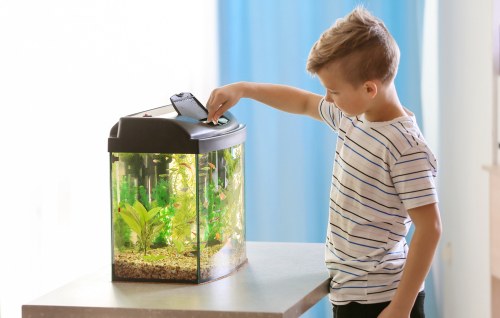
This option is probably the best, but it also comes with arguably the most significant risk. First, you’ll need to consider your location. Where you are primarily situated directly correlates with the types of fish sitters in your area. If it is in a small town where fishkeeping isn’t a known hobby, your chances of finding a good fish sitter are low.
You may encounter a few people who claim to have the ability to do it, but there’s no way of verifying it. On the other hand, staying in a bigger city with fish shops and aquarist groups will give you a more convincing way to contact a fish sitter.
Caring for goldfish involves a lot of attention. When you’re choosing a fish sitter, ensure that they are aware of your regular routine for caring for a goldfish. They should ensure that the pH, temperature, and filters are all in the right place. Plan ahead and prepare the right foods that should be given to your fish.
Also, provide them with a feeding schedule to follow. If your fish sitter has prior experience caring for fish, they’ll have a better chance of spotting unusual behavior, such as your goldfish not moving.
The Bottom Line
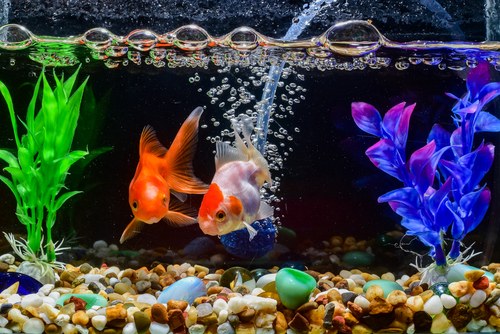
Goldfish are wonderful pets that make for good company. The best way to care for them is by keeping an eye on their needs. This guide provides all you need to know about feeding a goldfish and maintaining a good routine. Using this knowledge, you’ll stand a better chance of enjoying a vacation without worrying about your goldfish.


